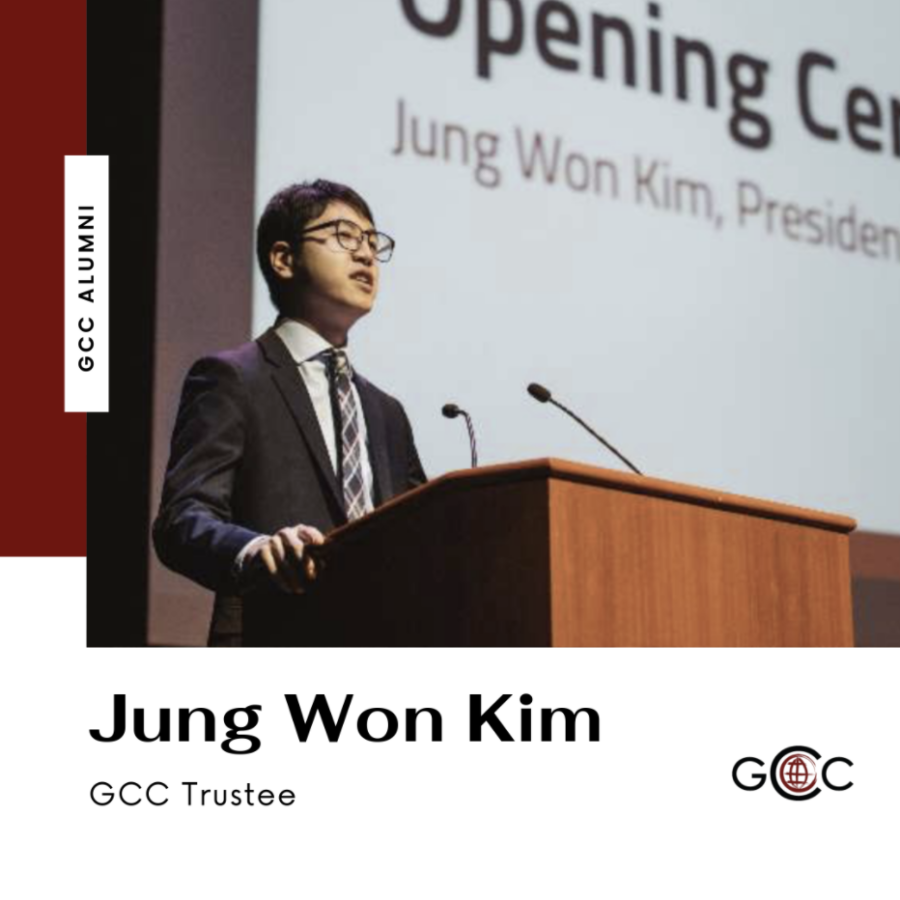Background
Can you briefly introduce yourself and your background?
I graduated from Cornell University in 2018, and have been in GCC since my freshman year. Currently I work at Capital One in the financial sponsors & leveraged finance practice based in New York.
Could you please share your experience at GCC? What was your most memorable experience?
At school, I served as the chapter president. At that time, the chapter was pretty small. One day I got an email from the then-president of GCC global team, and he was asking for volunteers to host the GCC summit. It sounded like a very good opportunity for our chapter, so we signed up for the summit. My most memorable experience was basically planning for that. Our members worked really hard day and night finding speakers, marketing the summit, and getting funding. We really struggled at that time as none of us had experience planning a conference before. One day it seemed as though everything was falling apart, but another day it would feel as though everything was going well. It went back and forth like that, and eventually the event was held successfully. I learned the most from that experience as well, kind of like throwing myself into fire along with my teammates. I highly recommend GCC chapters to sign up to host the summit so they can gain the same valuable experience from it as I did.
How did your experience with GCC help you in your later career? How did you transfer your skills and knowledge learned at GCC into your own professional work?
I learned a lot of transferable skills in GCC through planning the summit as well as through simple interactions with other GCC members. When I worked on the summit and other projects, there were other parties involved, so we need to match other’s timelines and criteria, and so there were a lot of deadlines and thus a lot of pressure. I really learned how to handle multiple tasks at the same time, while being calm in a highly pressured environment. My current job is fast paced and high-pressured, so a lot of same skills I learned in GCC are applied every day as well.
Internship Advice
You had multiple exciting internships experiences and they are all business related. Could you please share your experience in finding those internships as an undergraduate student?
During my school days, everyone was rushing for internship even in sophomore year and I believe it’s the same right now if not worse. Just 3 or 4 years before my time, people would enjoy their sophomore summer and go travel, and only in junior year they would really focus on finding jobs. Nowadays, there is a lot more pressure to find internships far earlier.
In my freshman year I didn’t know anything, and was interested in foreign policy at that time so I went to China during the summer to learn Chinese. In my sophomore year summer, I realized I really needed to get an internship so that it would allow me to get a junior internship which typically turns into a full time offer. My situation was that I was an econ major with no work experience. No one wants to hire a sophomore for a two month internship since he/she would be a net consumer of efficiency (factoring in time for training, etc). So at that time, I reached out to all my network and tried to find an opportunity. People might say to themselves that they are not lucky enough to have much connections and get an internship. But I would say go and try to reach out, because in this world everyone is connected to everyone and you never know what will happen. For me, I really couldn’t have imagined getting an experience in venture capital for my sophomore summer. I found this internship through a distant family friend. And so I went to Korea and did that internship which was a very cool experience. I was able to leverage that experience to get an offer from Capital One for my junior summer. So my advice is simply to reach out to your everyone in your network and apply to as many companies as you can. For me I applied to perhaps 150+ companies (a lot of people apply to far more). It’s not that hard if you already have a resume and a cover letter template.
What are some skills that you think are essential for those internships? What was your biggest takeaway of doing those internships?
As an intern for 10 weeks, you most likely aren’t going to be able to provide much value, but people in the company will teach you what to do and they will invest in you. To perform better in internships, always be proactive and ask what you can do to help. Raise your hand for even the most basic tasks such as data entry or putting together industry reports. There is no work that you are too good for. If you can show them that you are willing to provide value in any way and that they can trust you with the simpler items, they will eventually trust you and give you more complex and interesting work to do. Essentially, I’d say that the important skill here is to identify ways to make your superiors’ life easier, and then they will appreciate you which will lead to a better chance for a return offer.
Career Insights
Currently, you are working at Capital One. What does a typical day look like for you?
I’m in the leverage finance practice which means that my group’s clients tend to be private equity sponsors. The reason why that’s different from other lending groups is because private equity companies tend to use a lot more leverage (debt) as they acquire companies through leveraged buyouts, making the credit riskier. That means our group needs to do more in-depth credit analysis than otherwise. Because my group is deal-based, every day really looks different. I might work on a deal for two weeks but then work on another deal in a completely different industry. But typically, at my level I’m usually responsible for the cash flow model projections, so I will spend a couple hours looking over the management presentations, investor materials, industry reports, etc. I need to really understand how the company has performed historically as well as what its future cash flows are expected to be, then form my own conclusions / assumptions for my projections. In addition to the model, I would also work with the rest of the team (typically 2-3 others) to perform additional due diligence by speaking with company management, digging into third party research, examining terms of the credit agreements, etc.
What do you like most about your job?
My specific team is called Diversified Industries, which is pretty self-explanatory. My team handles deal from all sorts of industries ranging from casinos to food and beverage to chemicals, and more. In addition, every deal even in the same industry is structured differently. Thus, for every single deal I’m on, I am in a brand new situation and I’m constantly learning. Long story short, the diversity of the deals I get to work on is what I like most about my job.
Do you have any other advice for college students or even recent graduates?
My advice for college students is to leverage your network and cast a wide net to increase your opportunity. For recent graduates, try to always be slightly overwhelmed. That means go sign up for a task/deal that you may not be completely ready for, because the best way to learn and get ahead is to throw yourself in the fire and learn while doing. That’s the same mentality I had when I signed up for the summit for Cornell GCC, as well as during my internship at Capital One, and that is the same mentality I still have for my current job.









